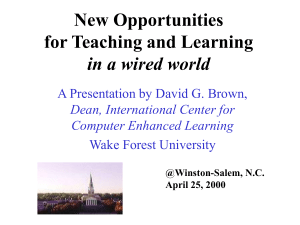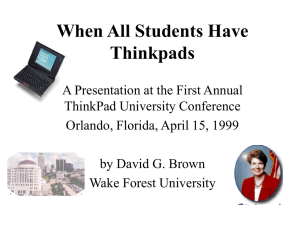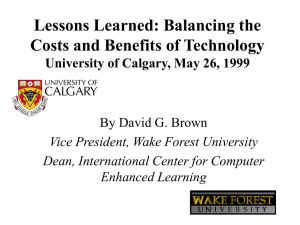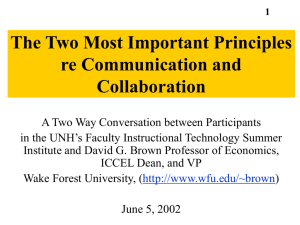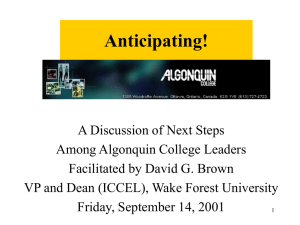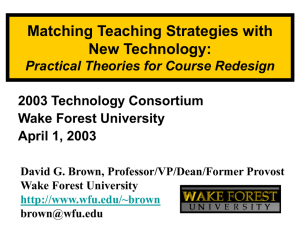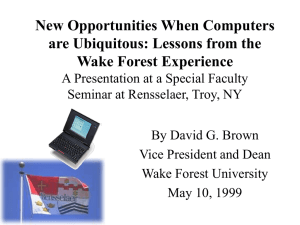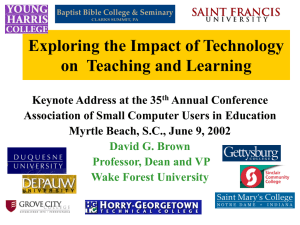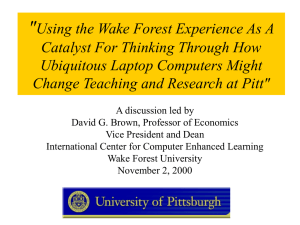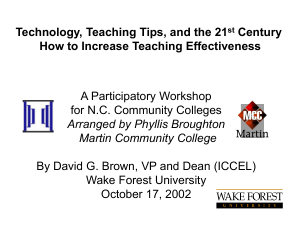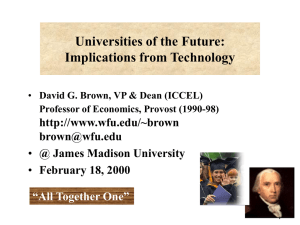PowerPoint - Wake Forest Student, Faculty and Staff Web Pages
advertisement
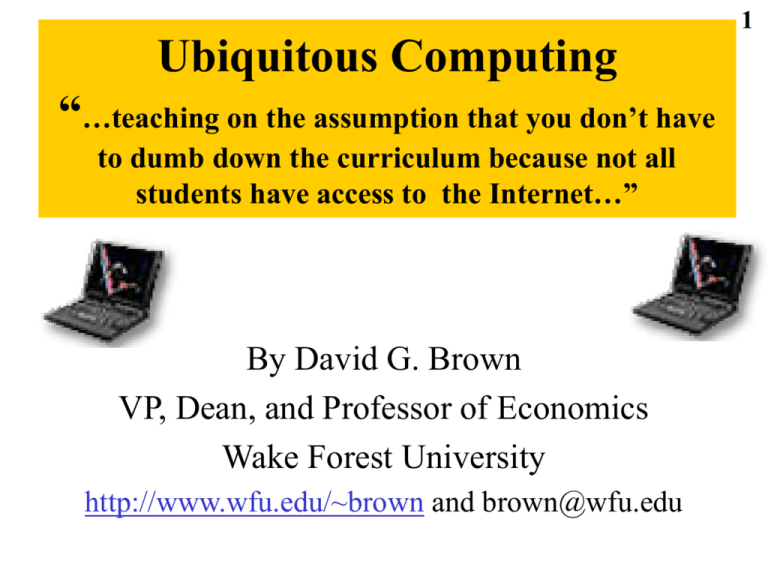
1 Ubiquitous Computing “…teaching on the assumption that you don’t have to dumb down the curriculum because not all students have access to the Internet…” By David G. Brown VP, Dean, and Professor of Economics Wake Forest University http://www.wfu.edu/~brown and brown@wfu.edu 2 8 BASIC MODELS OF UBIQUITOUS COMPUTING (Ordered by total cost, starting with the most expensive) • • • • • • • • All + Laptops + Annual Refresh (U Minnesota-Crk) Refresh Less Frequently (Wake Forest U) Substitute Desktop Computers (US Air Force Aca) Provide One Computer Per Two Beds (Chatham) Specify Threshold Level (U North Carolina) Substitute Network Computers Provide Public Station Computers (Boston College) Teach with Explicit Assumption of Access 3 Phase In Strategies • • • • • • • Annual Lease Phase in by classes Phase in by programs Phase in by type of program Phase in by category (faculty, students, staff) Hand me down Loaner Pool 4 THE WAKE FOREST PLAN IBM A21m, Pentium III, 800 Mhz, 20GB, 14.1”ActMatrix, 192mbRAM, Re-writable CD 56k modem, 8MB Video Ram, 10/100 Ethernet, Floppy, Lithium-ion Battery 12mbps USB & Serial & Parallel & Infrared Ports, 6.7 lbs. • • • • • • • • • • IBM Laptops for all Printers for all New Every 2 Years Own @ Graduation 31.000 Connections Standard Software 99% E-Mail Start 1995, 4 Year Phase In +15% Tuition for 37 Items +40 Faculty and 30 Staff •Windows 98 •Netscape Communicator 4.77 •MS Office2000 Pro •Dreamweaver 4 •Shockwave & Flash •Apple QuickTime 4.1.2 •Waterloo Maple V 6.0 •SPSS 10.1 •Real Player & Producer •Adaptec Easy CD •Norton Antivirus •Remedy AR Client 4.05/01 ICCEL -- Wake Forest University, 2001 5 Wake Forest University • • • • • • • • 3700 undergraduates 92% residential 500 each: Med, Law, MBA, PhD Winston-Salem, NC 1300 average SAT 28th in US News & World Report Top 35 Privates in Barron’s Guide Rhodes Scholars 6 The Big Three #1. E-mail #2. Course Web Pages (Blackboard) #3. Internet URLs 7 Ways of Thinking About Presidential Campaigns and Debates A First Year Seminar Introducing Students to the Liberal Arts 15 Freshmen Meet twice per week All with open laptops ICCEL -- Wake Forest University, 2001 8 Consequences for Wake Forest • • • • +SAT Scores & Class Ranks +Retention & Grad Rates +Satisfaction & Learning +Faculty Recruitment ICCEL -- Wake Forest University, 2001 9 Computers Enhance My Teaching and/or Learning Via-Presentations Better--20% More Opportunities to Practice & Analyze--35% More Access to Source Materials via Internet--43% More Communication with Faculty Colleagues, Classmates, and Between Faculty and Students--87% 10 Computers allow people---• to belong to more communities • to be more actively engaged in each community • with more people • over more miles • for more months and years • TO BE MORE COLLABORATIVE www.ankerpub.com 11 With Ubiquity--The Culture Changes • Mentality shifts-- like from public phone to personal phone. • Teaching Assumptions shift-- like from books in the public library to everyone owns a copy of his/her own. • Timelines shift-- like from “our class meets MWF” to “we contact each other all the time and MWF we meet together” • Time horizons shift– like from “I’ll be able to use this computer while in college” to “I’m learning to use a lifetime tool” • Students’ sense of access shifts-- like from “maybe I can get that book in the library” to “I have that book in my library.” • Relationships shift-- like from a family living in many different states to all family members living in the same town Confirmation from Professors at America’s Most Wired Universities • • • • • 12 Interactive Learning Collaborative Learning Communication www.ankerpub.com Visualization Different Strokes for Different Folks With standardization--• • • • • • Communication Utility! (George Gilder) 99% Reliability A Must in Classroom Buddies Share Hardware & Knowledge Better, Cheaper Support Systems Marketing Advantages Faculty “Trusts” Equality of Access 13 14 With Portability--• • • • • • • Continuous Contact & Faculty Availability More Student Collaboration More Curriculum Flexibility Easier Travel Abroad Quicker Exchange When Machine is Broken Fewer Computer Labs & More Classrooms Greater Sense of Ownership 15 BIG ISSUES • Communication vs Presentation vs Analysis vs Access to Internet • Virtual Courses vs Hybrids • Academic vs Administrative • Consortia vs Going It Alone • Today’s Students vs Alums Also • Mandatory vs Optional 16 BIG ISSUES • • • • • Laptop vs Desktop vs PDA Standard vs Threshold Single Vendor vs Multiple Vendors Buy vs Lease vs Student Buy Blackboard vs WebCT vs Learning Space vs Other Mgt Systems • Cold Turkey vs Pilot 17 Positioning for the Future • What are your institution’s strengths & weaknesses • How do you determine your place in an electronic world? • What will be your primary student markets--program areas? Degree credit? Geographic span? Age? • What are the appropriate delivery technologies next year? 5 years? Etc? • What is a realistic staffing plan? Outsourcing? Support personnel? Executive leadership? • What institutional partnerships make sense? 18 WHY COMPUTERS? …the institutional answer • • • • • • Communication! Level Playing Field After College Use Faculty/Students Demand Them Customized/Personalized Digitized Scholarship Brown’s First Year Seminar • Before Class – Students Find URLs & Identify Criteria – Interactive exercises – Just-in-Time Quizzes – E-mail dialogue – Cybershows & Lecture Notes • During Class – – – – – – One Minute Quiz Computer Tip Talk E-mails to Classmates Class Polls Team Projects Chat During Lecture • After Class – – – – Edit Drafts by Team Guest Editors Access Previous Papers Follow Up Discussion • Other – – – – – Daily Announcements Team Web Page Personal Web Pages Personal Portfolio Exams include Computer ICCEL -- Wake Forest University, 2001 19 20 Thoughts About the Future • • • • • • • • Customized Learning Collaboration in All Disciplines Hybrid Methodologies Every Person A Server Electronic Publications Confederations Branding Always in Touch 21 Five Course Design Strategies That Work #1. Continuous Communication #2. Preview and Review #3. Controversy and Debate #4. Different Strokes, Different Folks #5. Outsider Involvement 22 Faculty Development Concepts Worth Considering • • • • • • • • Eager Faculty Friendly Sharing (standardize!) Standard Course Shell Centrality of Educational Theory Diversity Among Disciplines Big 3 First (KISS) Start with Hybrid Courses Faculty to Faculty 23 Faculty Development Strategies-- Most Effective •Friends and Neighbors! •Full Time Academic Computer Specialists Trained and Located in Disciplines (ACS) •Well Trained Students Assigned to One Faculty Member for Full Semester (STARS) •Seminars Sponsored by the Center for Teaching and Learning (not only technology) •Tutorials re Equipment by Librarians •All Campus Help Desk 24 David G. Brown Wake Forest University Winston-Salem, N.C. 27109 336-758-4878 email: brown@wfu.edu http//:www.wfu.edu/~brown fax: 336-758-4875
